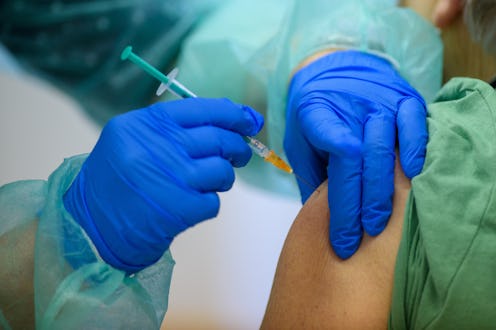Health
Doctors Think People Who Had COVID Should Still Get Vaccinated
Antibodies FTW.

Like millions of other Americans, you came through a case of COVID-19 earlier this year. Now that you've recovered, surely you don't still need to get a coronavirus vaccine, right? Though scientists initially thought COVID antibodies could protect people from getting re-infected with the disease, it turns out that's not quite how it works. Even if you've already had COVID, getting vaccinated is a good idea, experts say.
"For now it seems prudent to have everyone receive a vaccination when available, even if that person has previously had COVID," Dr. Robert Mordkin M.D., chief medical officer at testing company LetsGetChecked, tells Bustle. The CDC currently says that people who've had COVID-19 before may still be advised to get vaccinated, but it's waiting for more data to issue hard-and-fast guidance.
When your body fights an infection, including COVID-19, it develops specific antibodies that help protect against reinfection for a certain amount of time. "Current evidence suggests that immunity from having had naturally occurring COVID lasts five to seven months," Dr. Kathleen Jordan M.D., SVP of medical affairs at healthcare provider Tia, tells Bustle. A December study published in bioRxiV, not yet peer-reviewed, showed that some people can have antibodies in their systems after a COVID infection for six months, while another published in Science in December found that antibodies can last for up to five months.
But those antibody levels also seem to vary wildly, depending on factors like how bad your COVID-19 symptoms were. The bioRxiV study found that antibody levels differed by up to 200-fold in adults who'd had COVID; some people had loads, some virtually none. If you had a really hard time or were hospitalized with COVID, your antibody levels might be higher, and protect you for longer. If you were asymptomatic, they might fade a lot quicker.
It's also been shown to be possible to get COVID-19 twice. "The Lancet published a case study of repeat coronavirus infections in October which suggested symptoms may be worse on the second infection, but the outcome of repeat infections remains uncertain," Dr. Sachin Nagrani M.D., medical director of Heal, an online medical provider, tells Bustle. That's why scientists worked so hard on a vaccine; just surviving the disease doesn't guarantee you won't catch it again.
"The mRNA vaccines are intended and designed to confer much longer periods of immunity — hopefully years! — so it seems likely that those who have already had COVID may benefit from subsequent vaccination," Dr. Jordan says. If you've just had COVID-19, experts aren't sure if getting a vaccine immediately afterwards is a good idea. "The optimal timing of vaccination post-disease remains to be seen," Dr. Jordan says. She explains that other vaccination programs have taught scientists that you'll respond best after you've fully recovered from your illness, and some time has elapsed — so your own antibodies have faded, and a vaccine is needed to help your immune response along. But right now, there's no guidance on whether this will apply to COVID-19 vaccinations. Besides, if you're still infectious, the best course of action is to stay home and not put other people, including vaccine providers, at risk.
Dr. Mordkin notes that all the vaccines will fade over time; just like the flu jab, these aren't lifetime vaccines. Only 3% of the participants in Pfizer's vaccine trials had already had COVID, which is too small a number to draw strong conclusions. "I suspect more clarity and guidance on this issue will be coming from the CDC and WHO in the weeks and months ahead," Dr. Mordkin says. The Food and Drug Association's emergency use authorization for the Pfizer vaccine, published on Dec. 11, says it's suitable for everybody except those who have a severe allergic reaction to the vaccine. If you've had COVID-19, it's a good plan to chat to your GP once you're eligible for a vaccine, and keep an eye on vaccine guidance as it comes out.
Experts:
Dr. Kathleen Jordan M.D.
Dr. Sachin Nagrani M.D.
Dr. Robert Mordkin M.D.
Studies cited:
Gaebler, C., Wang, Z., Lorenzi, J., Muecksch, F., Finkin, S., Tokuyama, M., Ladinsky, M., Cho, A., Jankovic, M., Schaefer-Babajew, D., Oliveira, T. Y., Cipolla, M., Viant, C., Barnes, C. O., Hurley, A., Turroja, M., Gordon, K., Millard, K. G., Ramos, V., Schmidt, F., … Nussenzweig, M. C. (2020). Evolution of Antibody Immunity to SARS-CoV-2. bioRxiv : the preprint server for biology, 2020.11.03.367391. https://doi.org/10.1101/2020.11.03.36739
Tillett, R. L., Sevinsky, J. R., Hartley, P. D., Kerwin, H., Crawford, N., Gorzalski, A., Laverdure, C., Verma, S. C., Rossetto, C. C., Jackson, D., Farrell, M. J., Van Hooser, S., & Pandori, M. (2020). Genomic evidence for reinfection with SARS-CoV-2: a case study. The Lancet. Infectious diseases, S1473-3099(20)30764-7. Advance online publication. https://doi.org/10.1016/S1473-3099(20)30764-7
Wajnberg, A., Amanat, F., Firpo, A., Altman, D. R., Bailey, M. J., Mansour, M., McMahon, M., Meade, P., Mendu, D. R., Muellers, K., Stadlbauer, D., Stone, K., Strohmeier, S., Simon, V., Aberg, J., Reich, D. L., Krammer, F., & Cordon-Cardo, C. (2020). Robust neutralizing antibodies to SARS-CoV-2 infection persist for months. Science (New York, N.Y.), 370(6521), 1227–1230. https://doi.org/10.1126/science.abd7728
Widge, A. T., Rouphael, N. G., Jackson, L. A., Anderson, E. J., Roberts, P. C., Makhene, M., Chappell, J. D., Denison, M. R., Stevens, L. J., Pruijssers, A. J., McDermott, A. B., Flach, B., Lin, B. C., Doria-Rose, N. A., O'Dell, S., Schmidt, S. D., Neuzil, K. M., Bennett, H., Leav, B., Makowski, M., … mRNA-1273 Study Group (2020). Durability of Responses after SARS-CoV-2 mRNA-1273 Vaccination. The New England journal of medicine, 10.1056/NEJMc2032195. Advance online publication. https://doi.org/10.1056/NEJMc2032195
This article was originally published on